-
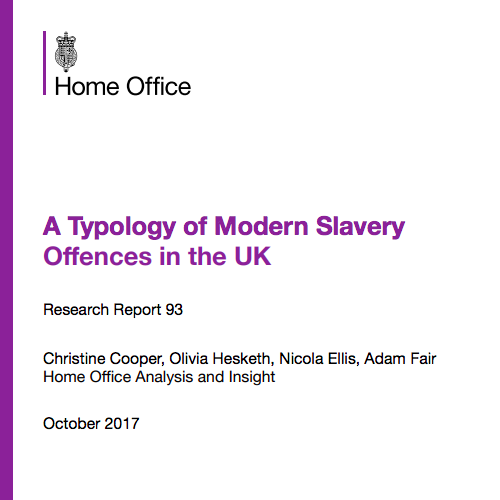 This report presents findings from research to create an evidence‐based typology of modern slavery offences in the UK. The research sought to devise a typology of modern slavery offences to improve the government's understanding of the different ways that modern slavery manifests in the UK and to inform tailored policy and operational responses. The typology, which is based on analysis on 328 confirmed cases of modern slavery in the UK, identifies 17 types of modern slavery offences setting out the characteristics of the victims, offenders and offences involved for each type.
This report presents findings from research to create an evidence‐based typology of modern slavery offences in the UK. The research sought to devise a typology of modern slavery offences to improve the government's understanding of the different ways that modern slavery manifests in the UK and to inform tailored policy and operational responses. The typology, which is based on analysis on 328 confirmed cases of modern slavery in the UK, identifies 17 types of modern slavery offences setting out the characteristics of the victims, offenders and offences involved for each type. -
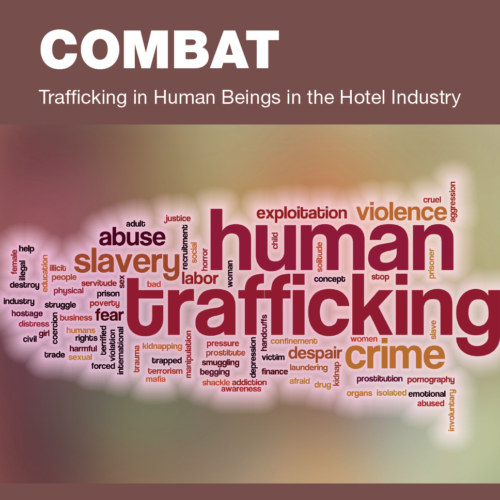 The COMBAT Toolkit is designed specifically to help hotels tackle the problem of human trafficking by helping staff to identify specific signs of trafficking. It comprises reference guides with accompanying powerpoints, case studies with accompanying powerpoint for training sessions, a trainer's manual, a series of 10-minute trainers, aide memoires and example awareness-raising posters. The aide memoire is a physical prompt that can be distributed to all hotel staff and employees, to remind them of the signs of trafficking and how to report it.
The COMBAT Toolkit is designed specifically to help hotels tackle the problem of human trafficking by helping staff to identify specific signs of trafficking. It comprises reference guides with accompanying powerpoints, case studies with accompanying powerpoint for training sessions, a trainer's manual, a series of 10-minute trainers, aide memoires and example awareness-raising posters. The aide memoire is a physical prompt that can be distributed to all hotel staff and employees, to remind them of the signs of trafficking and how to report it.Credit: COMBAT
-
 The COMBAT Toolkit is designed specifically to help hotels tackle the problem of human trafficking by helping staff to identify specific signs of trafficking. It comprises reference guides with accompanying powerpoints, case studies with accompanying powerpoint for training sessions, a trainer's manual, a series of 10-minute trainers, aide memoires and example awareness-raising posters. These example posters can be reproduced and distributed around hotels to raise awareness of human trafficking and encourage reporting via appropriate channels. They come from a range of campaigns (some non-English) and are intended for back-of-house display to hotel employees.
The COMBAT Toolkit is designed specifically to help hotels tackle the problem of human trafficking by helping staff to identify specific signs of trafficking. It comprises reference guides with accompanying powerpoints, case studies with accompanying powerpoint for training sessions, a trainer's manual, a series of 10-minute trainers, aide memoires and example awareness-raising posters. These example posters can be reproduced and distributed around hotels to raise awareness of human trafficking and encourage reporting via appropriate channels. They come from a range of campaigns (some non-English) and are intended for back-of-house display to hotel employees.Credit: COMBAT
-
 The COMBAT Toolkit is designed specifically to help hotels tackle the problem of human trafficking by helping staff to identify specific signs of trafficking. It comprises reference guides with accompanying powerpoints, case studies with accompanying powerpoint for training sessions, a trainer's manual, a series of 10-minute trainers, aide memoires and example awareness-raising posters. These 10-minute long trainers are designed and tailored as training materials both for those working outside the industry, and for staff working in hotels. Some are department specific such as food and beverage or management, others are more generic. There is also a trainer to educate more generally on how to spot the signs of trafficking in hotels. These are intended for managers and shift leaders to offer as short training at the beginning of shifts, for the trainer to offer as a refresher or as entry into deeper discussion on specific issues.
The COMBAT Toolkit is designed specifically to help hotels tackle the problem of human trafficking by helping staff to identify specific signs of trafficking. It comprises reference guides with accompanying powerpoints, case studies with accompanying powerpoint for training sessions, a trainer's manual, a series of 10-minute trainers, aide memoires and example awareness-raising posters. These 10-minute long trainers are designed and tailored as training materials both for those working outside the industry, and for staff working in hotels. Some are department specific such as food and beverage or management, others are more generic. There is also a trainer to educate more generally on how to spot the signs of trafficking in hotels. These are intended for managers and shift leaders to offer as short training at the beginning of shifts, for the trainer to offer as a refresher or as entry into deeper discussion on specific issues.Credit: COMBAT
Spotting the Signs _________________________________________________________________ For Public Authorities For Corporates For Employees: For Management For Food & Beverage For Front Office For Housekeeping -
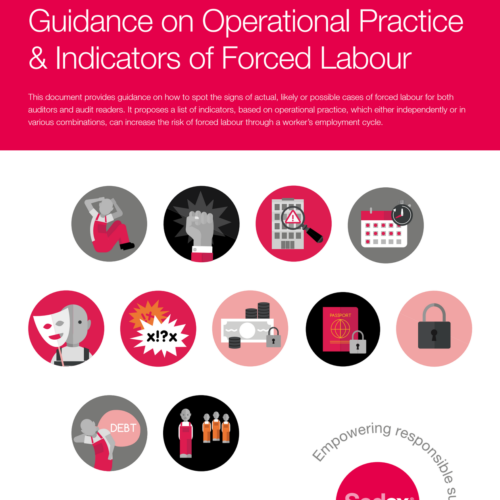 Sedex is a global NGO which provides the world's largest collaborative platform for sharing responsible sourcing data on supply chains. The Sedex Stakeholder Forum (previously the Associated Auditor Group) brings together brings together leaders across the ethical trade and responsible sourcing industry to discuss the challenges they collectively face and solve those problems collaboratively. This guidance provides information on how to spot signs of exploitation for auditors and audit readers. It includes a list of indicators of exploitation, based on operational practice, which can increase a person's risk to human trafficking. It also highlights the importance of protecting potential victims, and advises auditors on how to capture evidence and document potential exploitation of workers. It is intended for use by auditing bodies, ethical sourcing initiatives and brands to help them understand the risks of forced labour, and enhance their existing auditing protocols.
Sedex is a global NGO which provides the world's largest collaborative platform for sharing responsible sourcing data on supply chains. The Sedex Stakeholder Forum (previously the Associated Auditor Group) brings together brings together leaders across the ethical trade and responsible sourcing industry to discuss the challenges they collectively face and solve those problems collaboratively. This guidance provides information on how to spot signs of exploitation for auditors and audit readers. It includes a list of indicators of exploitation, based on operational practice, which can increase a person's risk to human trafficking. It also highlights the importance of protecting potential victims, and advises auditors on how to capture evidence and document potential exploitation of workers. It is intended for use by auditing bodies, ethical sourcing initiatives and brands to help them understand the risks of forced labour, and enhance their existing auditing protocols.Credit: Sedex
-
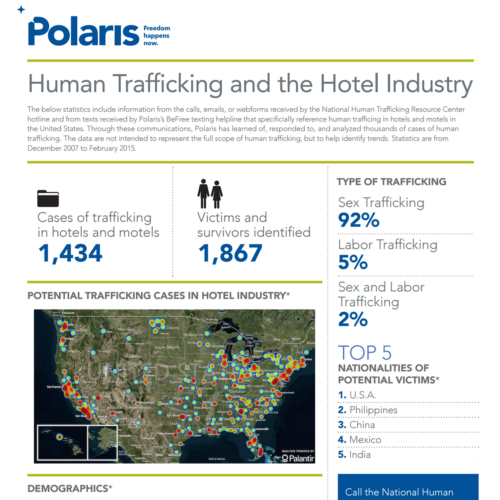 This infographic factsheet from Polaris has been put together using statistics from the National Human Trafficking Resource Centre hotline and texts from the Polaris BeFree texting helpline. It specifically references human trafficking in hotels and motels in the US. The data is used to identify trends in cases and indicators of sex and labour trafficking in hotels, and the factsheet provides recommendations for the hotel industry.
This infographic factsheet from Polaris has been put together using statistics from the National Human Trafficking Resource Centre hotline and texts from the Polaris BeFree texting helpline. It specifically references human trafficking in hotels and motels in the US. The data is used to identify trends in cases and indicators of sex and labour trafficking in hotels, and the factsheet provides recommendations for the hotel industry.Credit: Polaris Project
-
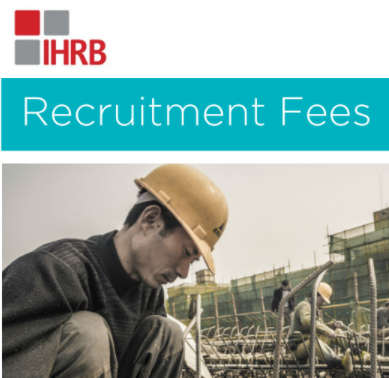 This is a briefing produced by the think tank IHRB on tackling the exploitative recruiter practice of charging recruitment fees. It outlines the harms of recruitment fees for workers and highlights how businesses can support migrant workers through legal compliance and transparency.
This is a briefing produced by the think tank IHRB on tackling the exploitative recruiter practice of charging recruitment fees. It outlines the harms of recruitment fees for workers and highlights how businesses can support migrant workers through legal compliance and transparency.Credit: Institute for Human Rights and Business (IHRB)

